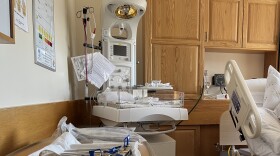By the end of this year, New Hampshire families will have lost two places to turn to give birth, continuing a years-long trend of maternity unit closures in the Granite State and across the country.
Both Alice Peck Day Memorial Hospital, in Lebanon, and Lakes Region General Hospital, operated by LRGHealthcare in Laconia, plan to close labor and delivery services later this year.
Alice Peck plans to start sending expectant mothers to Dartmouth-Hitchcock in mid-July, while LRGHealthcare says its Family Birthplace will close at the end of May. LRGHealthcare officials say they’re working with Concord Hospital to provide alternate labor and delivery services to patients in their existing coverage area.
Both hospitals said they were grappling with the same issues that are making it hard for rural hospitals across the country to keep their maternity units in business, namely: financial losses, shifting demographics and difficulty recruiting qualified staff.
"It's really the confluence of all of those factors that adds up," Alice Peck CEO Susan Mooney told NHPR on Thursday. "If you had any one of them, I think we could manage. But they add on each other, and this cumulative effect of — really, it's just not a sustainable program."
Mooney said her hospital has struggled for years to keep their unit afloat, and shifting care to nearby Dartmouth-Hitchcock makes financial sense given the hospitals' recent affiliation.
Still, as a trained physician who spent more than a decade helping to deliver babies, Mooney said she worries what the shifting landscape around maternity access means for patients.
"Maternity care is foundational to healthy communities and healthy families, and I really have concerns when that starts to go away," Mooney told NHPR on Thursday. "As an obstetrician, I have real grave concerns about the closure of obstetric units in rural areas. I think it's something that deserves a statewide conversation, if not a national conversation."
In addition to closing the Laconia family birthplace, LRGHealthcarealso plans to close family practices in Bristol and Moultonborough, a pediatric clinic in Laconia and an elective surgery unit in Franklin.
LRGHealthcare first publicly signaled plans to review the future of its maternity unit and other services in January, citing financial problems.
At the time, CEO Kevin Donovan said the hospital’s maternity unit was among those targeted for potential closure in part because low reimbursement rates and declining birthrates made it increasingly difficult for the hospital to break even financially. Donovan said roughly 60 percent of births at Lakes Region Hospital are paid for through Medicaid, and the program’s reimbursement rates fall well below what it actually costs to cover labor and delivery services.
"The anecdotal number is that you need around 1,000 to make sure you can have a financially sustainable model,” Donovan said in January. “When we're running 283 births last year, we're well below that number."
Since 2000, at least seven other hospitals across New Hampshire have shuttered their labor and delivery units: New London Hospital, Upper Connecticut Valley Hospital in Colebrook, Franklin Regional Hospital, Weeks Medical Center in Lancaster, Huggins Hospital in Wolfeboro, Valley Regional Hospital in Claremont and Cottage Hospital in Woodsville.
New Hampshire is hardly alone in experiencing a growing scarcity of rural maternity care. One recent study found that more than half of all rural counties nationwide lack a hospital with obstetric services.







